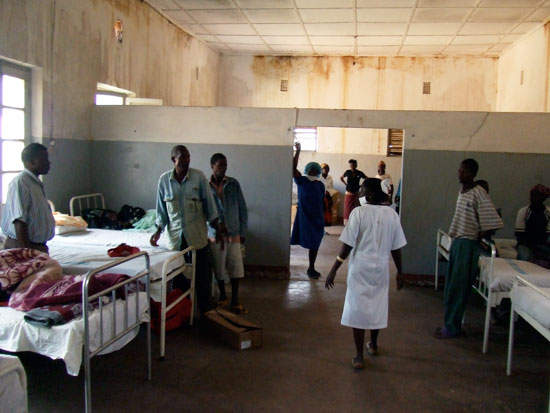Life in the Developing Ward - Dr. Ryan Meili
June 2010
Massinga Rural Hospital is located across a sandy road from the Massinga Centre for Continuing Education. It consists of a collection of one-story buildings around a central courtyard dominated by an acacia tree recently split by lightning. The courtyard is home to waiting patients, visiting families, and alternately (on a schedule I've yet to understand) either pigs, ducks or turkeys.
The initial impression for visitors is one of stark contrasts. Some of the buildings are newly and brightly painted in a surprisingly appealing hospital green. Others are in a state of permanent decay, looking as though they barely survived the war and no one wanted to stress them any further through renovation. To me the hospital is a place of modest hope. It is a place not of radical overnight improvement, but of unsteady, wavering yet real progress. As such it serves as a way of understanding that the developing world is not stuck, that it is developing however slow and strenuous that may seem.
When I first visited in 2002 the old, broken down buildings were all we had. I remember delivering my first baby by lantern light in the back room of the worst of the surviving buildings. On rounds I would look around trying to find some sign that would indicate we were in the new millenium and not the 1920s. Excepting the antibiotics, when we had them, I found nothing.

With each visit came new changes. New buildings were erected, some old ones torn down. Pediatrics moved from a dark, dingy cave of a ward to a bright, open space decorated with drawings from local high schoolers. HIV rates rose, but antiretroviral treatment finally arrived. A surgical ward was built, but because of no electricity it was used for years to dry laundry on rainy days. One memory that captures the anachronism well is watching a young doctor listen to a baby's heartbeat with an old-fashioned tin trumpet, while timing the rate on her cellphone. Things advance and retreat, but the general trend is toward improvement and that means a great deal for the 200,000 plus served by this two doctor hospital.
Today was our first day at the hospital and this year the differences are prominent once more. It starts with people. Old friends beam, excited to see Dr David back again (Ryan is pretty much unpronounceable in Portuguese so I use my middle name), to quiz my rusty Xitswa, and tease me about my marriage or my haircut. Soon the talk turns to faces not seen. As always some people have moved on to other work, others have died due to AIDS or car accidents. Others have studied and moved up from cleaning staff to patient care, from basic nursing to operating room technicians.
The hospital itself is again home to disappointments and improvements. The Sala de Espera (waiting room for expectant mothers) is full of rats, as is the pharmacy. There are fewer lab tests available and the men's and women's wards are still filthy and depressing. Treatment of patients is still brusque and undignified. On the other hand, there is now a surgery technician and an anaesthesia technician, which means that the OR is being used for more than drying laundry: C-sections and appendectomies are saving lives and a fortune in transport costs. Two new young doctors are keen on improving hospital services and morale, and have introduced regular ward transfer rounds and continuing education. The staff in general seems more engaged and willing to learn.
Mozambique and Massinga Rural Hospital are places that demand patience and inspire hope. The burdens of poverty and disease are enormous, the weight of history and global injustice ever-present, but despite all that the country moves forward. The people are free and self-governed, more boys and girls go to school, more go as far as university, more buildings are built, more companies are formed, more people eat well, more receive the medical treatment they need and deserve. The development continues, in unpredictable and frustrating fits and starts, but it continues.

